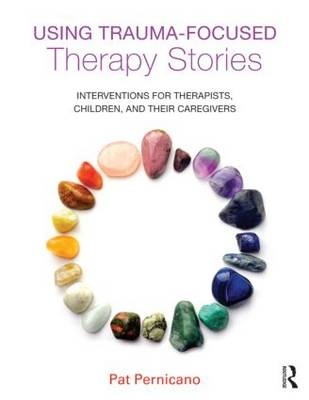
Using Trauma-Focused Therapy Stories
Routledge (Verlag)
978-0-415-72692-4 (ISBN)
is a groundbreaking treatment resource for trauma-informed therapists who work with abused and neglected children ages nine years and older as well as their caregivers.
Using Trauma-Focused Therapy Stories is a groundbreaking treatment resource for trauma-informed therapists who work with abused and neglected children ages nine years and older as well as their caregivers. The therapy stories are perfect accompaniments to evidence-based treatment approaches and provide the foundation for psychoeducation and intervention with the older elementary-aged child or early pre-teen. Therapists will also benefit from the inclusion of thorough guides for children and caregivers, which illustrate trauma and developmental concepts in easy-to-understand terms. The psychoeducational material in the guides, written at a third- to fourth-grade reading level, may be used within any trauma-informed therapy model in the therapy office or sent-home for follow-up. Each therapy story illustrates trauma concepts, guides trauma narrative and cognitive restructuring work, and illuminates caregiver blind spots; the caregiver stories target issues that often become barriers to family trauma recovery. No therapist who works with young trauma survivors will want to be without this book, and school-based professionals, social workers, psychologists and others committed to working with traumatized children will find the book chock-full of game-changing ideas for their practice.
Pat Pernicano, PsyD, is currently a psychologist with Personal Counseling Services and served as the director of clinical services at Providence House for Children between 2007 and 2013. She is associate professor on the clinical faculty at Spalding University, where she has taught in the PsyD program since 1996.
Preface Part I. Therapist Guide to Trauma and Use of Therapy Stories 1. Overview of the Impact of Trauma 2. Using Narrative, Metaphor and Trauma Focused Stories in Trauma Intervention Part II. Therapy Stories to Use with Children 1. Trauma Triggers: The False Alarm 2. Impact of Trauma: Lucky the Junkyard Dog 3. Repeated Exposure to Abusive Behavior: Trick or Treat 4. Avoidance: The Hidey Hole 5. Trauma Narrative: Bear of a Different Color 6. Self-Blame: Bear’s Self-Blame Game 7. Coping with Stress: The Burden Bag 8. Letting Out Negative Feelings: A Little at a Time 9. Self-Control: Keep the Lion on a Leash 10. Anger-Control (Bullying): The Dragon’s Fire 11. Protective Behaviors: Safety in Numbers 12. Coping with Depression: The Black Cloud 13. Coping with Obsessive Compulsive Behaviors: The Magic Stone 14. Containing Fear and Anxiety: Wrap It Up 15. Self-Acceptance: The Furry Boa 16. Unconditional Love: The Bulldog’s Dilemma 17. Pre-Verbal Trauma Narrative: Little Butterfly and the Bad Thing 18. Sibling Trauma Narrative: Stick Together 18. Family Trauma Narrative: The Hidey Hole 19. Coping with Phobic Anxiety: The Grounded Eagle 20. Attachment Work for Pre-Verbal Trauma: The New Cocoon 21. Living in Out of Home Care: The Good Enough Elf 22. High-Risk Behaviors: The Moth and the Flame 23. Safety Around Perpetrators: The Hungry Alligator and the Mean Snake 24. Grooming Behavior: Party Games 25. Cross-Generational Trauma: Grandma’s Alligator Part III. Therapy Stories to Use with Adolescents 1. Fight and Flight: The Monster Within 2. Showing Your True Feelings: The Mixed Up Clown 3. Blaming Others: Poop in the Barnyard 4. Mood Regulation and Self-Control: The Feral Cat 5. Cognitive Processing: Let it Simmer 6. Vigilance: Looking for Landmines in Disneyland 7. Coping with an Eating Disorder: The Twin in the Mirror 8. Choices in Dating Relationships: No More Rotten Eggs 9. Feeling Broken or Damaged: The Cracked Glass Bowl 10. Defensive Protection: Polly's Plight 11. Dissociation and Part-Self Work: A Safe Place to Call Home 12. Self Integration: The Unraveled Tapestry 13. Coping with Heartbreak: The Girl with the Plastic Heart 14. Moving in a New Direction: Gold in the Desert 15. Escaping Family Patterns: Swimming in the Swamp Part IV. Therapy Stories to Use with Caregivers 1. Co-Dependency: Don't Let the Leeches Suck You Dry 2. Relational Control: The Dance 3. The Cycle of Violence: Chip Away 4. Protectiveness with Children: Does He Bite? 5. Parental Risk Taking: The Balancing Act 6. Attachment Needs: Velma Crowe's Sticky Situation 7. Empathy vs. Blame: First Things First Part V. Child’s Guide to Trauma and Healing from Trauma 1. Introduction to the Child 2. The Impact of Abuse 3. Freak- Out (Vigilance and Alert) 4. Freeze or High Emotion (Alarm) 5. Flight (Fear) 6. Fight (Terror) 7. Abuse and Trauma 8. PTSD and Complex Trauma 9. How Stress Affects Kids 10. Memory of Abuse 11. How Adults Can Help (or Hurt) Abused Kids 12. The Trauma Stress Chain Reaction: Freakout 13. The Trauma Stress Chain Reaction: Freeze 14. The Trauma Stress Chain Reaction: Flight 15. The Trauma Stress Chain Reaction: Fight 16. Your Own Chain Reaction 17. What Does Your Brain Have to Do With It? 18. How Stress Changes Your Brain 19. Coping Skills to Get Over Abuse: Calm Down 20. Coping Skills: Connect 21. Coping Skills: Conquer Part VI. Caregiver’s Guide to Trauma 1. Impact of Trauma on Development 2. Neurobiology and Trauma 3. Caregiver Stress and Self-Care.
| Erscheint lt. Verlag | 5.3.2014 |
|---|---|
| Zusatzinfo | 8 Tables, black and white; 2 Line drawings, black and white; 2 Illustrations, black and white |
| Verlagsort | London |
| Sprache | englisch |
| Maße | 210 x 280 mm |
| Gewicht | 657 g |
| Themenwelt | Geisteswissenschaften ► Psychologie ► Entwicklungspsychologie |
| Geisteswissenschaften ► Psychologie ► Klinische Psychologie | |
| Geisteswissenschaften ► Psychologie ► Pädagogische Psychologie | |
| Medizin / Pharmazie ► Medizinische Fachgebiete ► Notfallmedizin | |
| Medizin / Pharmazie ► Medizinische Fachgebiete ► Pädiatrie | |
| Medizin / Pharmazie ► Medizinische Fachgebiete ► Psychiatrie / Psychotherapie | |
| Sozialwissenschaften ► Pädagogik ► Didaktik | |
| Sozialwissenschaften ► Pädagogik ► Sozialpädagogik | |
| Sozialwissenschaften ► Soziologie | |
| ISBN-10 | 0-415-72692-1 / 0415726921 |
| ISBN-13 | 978-0-415-72692-4 / 9780415726924 |
| Zustand | Neuware |
| Haben Sie eine Frage zum Produkt? |
aus dem Bereich


